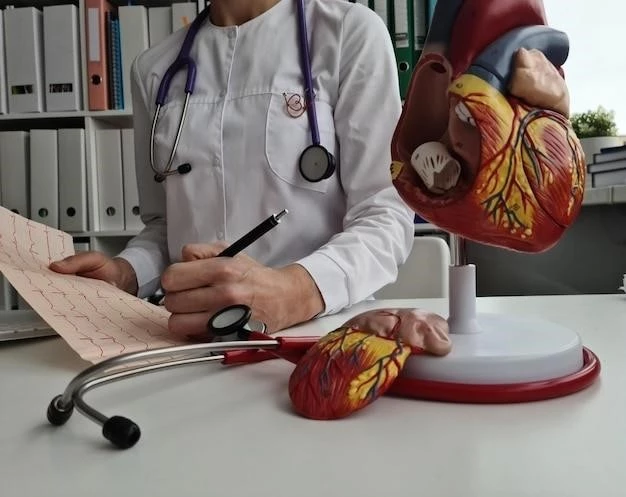Understanding Cardiospasm
Causes of Cardiospasm⁚ Identifying triggers like stress, certain foods, or smoking can help manage symptoms․
Symptoms of Cardiospasm⁚ Chest pain, difficulty swallowing, and regurgitation are common signs to watch for․
Diagnosis of Cardiospasm⁚ Tests like endoscopy and pH monitoring can help confirm the condition․
Treatment Options for Cardiospasm⁚ Medications, dilation procedures, and surgery are available treatments to discuss with your doctor․
Causes of Cardiospasm
Cardiospasm, also known as Achalasia, occurs when the lower esophageal sphincter (LES) fails to relax and allow food to pass into the stomach․ The exact cause of this condition is unknown, but several factors may contribute⁚
- Nerve Damage⁚ Damage to the nerves controlling the esophagus can disrupt the normal swallowing process․
- Autoimmune Reaction⁚ Some theories suggest that an autoimmune response may damage the esophageal nerves․
- Inherited Factors⁚ There may be a genetic predisposition to developing cardiospasm․
- Viruses⁚ Certain viral infections have been linked to the onset of Achalasia․
- Abnormal Immune Response⁚ An abnormal immune response in the body may affect the esophageal function․
It’s essential to consult a healthcare professional for a comprehensive evaluation if you experience symptoms of cardiospasm to determine the underlying cause and develop an appropriate treatment plan tailored to your needs․
Symptoms of Cardiospasm
Recognizing the symptoms of cardiospasm, or Achalasia, is crucial for early detection and management․ Common signs include⁚
- Chest Pain⁚ Persistent or worsening chest discomfort, often after eating․
- Difficulty Swallowing⁚ Feeling like food gets stuck in the chest or throat․
- Regurgitation⁚ Bringing back up undigested food or liquid shortly after eating․
- Heartburn⁚ Persistent heartburn that doesn’t respond to typical antacids․
- Weight Loss⁚ Unintentional weight loss due to difficulty eating․
- Coughing⁚ Chronic coughing, especially at night․
If you experience these symptoms, consult a healthcare provider for a proper diagnosis and to discuss appropriate treatment options․ Early intervention can help manage the condition effectively and improve your quality of life;
Diagnosis of Cardiospasm
Diagnosing cardiospasm, also known as Achalasia, involves several tests to confirm the condition and rule out other underlying issues; Diagnostic procedures may include⁚
- Endoscopy⁚ A thin, flexible tube with a camera is passed into the esophagus to examine the tissues․
- Esophageal Manometry⁚ Measures pressure and coordination of esophageal contractions․
- Barium Swallow⁚ X-rays are taken after swallowing a contrast material to visualize the esophagus․
- pH Monitoring⁚ Monitors acid levels in the esophagus to rule out conditions like GERD․
- Blood Tests⁚ Can help identify any underlying conditions that may contribute to symptoms․
It is essential to undergo these diagnostic tests under the guidance of a healthcare professional specialized in digestive disorders․ A timely and accurate diagnosis can lead to appropriate treatment and better management of cardiospasm․

Treatment Options for Cardiospasm
When it comes to managing cardiospasm, treatment options aim to alleviate symptoms and improve swallowing function․ Depending on the severity of the condition, various approaches may be considered⁚
- Medications⁚ Muscle relaxants or calcium channel blockers can help relax the LES․
- Balloon Dilation⁚ A procedure where a balloon is inflated to widen the esophagus․
- Botox Injections⁚ Injecting botulinum toxin to relax the LES temporarily․
- Surgery⁚ Surgical interventions like a Heller myotomy to cut the LES muscles․
- Pneumatic Dilatation⁚ Widening the esophagus with a balloon under endoscopic guidance․
It’s essential to consult a gastroenterologist or a healthcare provider specializing in digestive disorders to discuss the most suitable treatment option based on individual circumstances․ Regular follow-ups and adherence to the prescribed treatment plan are crucial for managing cardiospasm effectively․
Lifestyle Changes for Managing Cardiospasm
Along with medical interventions, certain lifestyle modifications can help in managing the symptoms of cardiospasm and improve overall well-being․ Consider incorporating the following changes into your routine⁚
- Dietary Adjustments⁚ Avoid foods that trigger symptoms like spicy or acidic foods․
- Eating Habits⁚ Eat smaller, more frequent meals and chew food thoroughly․
- Posture⁚ Sit upright while eating and avoid lying down right after meals․
- Stress Management⁚ Practice relaxation techniques like meditation or yoga to reduce stress;
- Avoid Smoking⁚ Smoking can worsen symptoms, so quitting can be beneficial․
- Regular Exercise⁚ Engage in gentle exercises to promote digestion and overall health․
It’s important to discuss these lifestyle changes with your healthcare provider to ensure they complement your treatment plan effectively․ By making simple adjustments, you can enhance the management of cardiospasm and improve your quality of life․
Cardiospasm in Children
While cardiospasm, or Achalasia, is more commonly diagnosed in adults, it can also affect children․ Recognizing symptoms early in children is crucial for prompt intervention and management․ Some key points to consider regarding cardiospasm in children include⁚
- Symptoms⁚ Children may experience difficulty swallowing, chest pain, regurgitation, and weight loss․
- Diagnosis⁚ Diagnostic tests like barium swallow and esophageal manometry may be performed to confirm the condition․
- Treatment⁚ Treatment approaches in children may include medications, balloon dilation, or surgery under the guidance of pediatric specialists․
- Nutritional Support⁚ Ensuring adequate nutrition is essential, and working with healthcare providers to address feeding challenges is important․
If you suspect your child has symptoms of cardiospasm, consult a pediatric gastroenterologist for a thorough evaluation and tailored treatment plan․ Early detection and appropriate management can help alleviate symptoms and ensure optimal growth and development in children․
Complications of Cardiospasm
Although cardiospasm, or Achalasia, primarily affects the esophagus, it can lead to various complications if left untreated or poorly managed․ Some potential complications associated with cardiospasm include⁚
- Aspiration Pneumonia⁚ Inhalation of food or stomach contents into the lungs can cause lung infections․
- Esophageal Stricture⁚ Narrowing of the esophagus due to scarring, making swallowing difficult․
- Megaesophagus⁚ Enlargement of the esophagus, leading to impaired motility and food retention․
- Weight Loss and Malnutrition⁚ Difficulty eating can result in inadequate nutrient intake and weight loss․
- Esophageal Cancer Risk⁚ Long-standing Achalasia may slightly increase the risk of esophageal cancer․
It is essential to seek medical attention if you experience symptoms of cardiospasm to prevent complications․ Early diagnosis, appropriate treatment, and regular monitoring can help manage the condition effectively and reduce the risk of severe complications․
Prevention Strategies for Cardiospasm
While the exact cause of cardiospasm, or Achalasia, remains unclear, there are no definitive prevention strategies known at present․ However, certain lifestyle practices and habits may help support overall esophageal health and potentially reduce the risk of symptoms⁚
- Healthy Diet⁚ Consuming a well-balanced diet rich in fiber, fruits, and vegetables may support overall digestive health․
- Manage Stress⁚ Stress can exacerbate digestive issues, so incorporating stress-reduction techniques like yoga or meditation may be beneficial․
- Avoid Smoking⁚ Smoking can contribute to esophageal issues, so quitting smoking or avoiding exposure to smoke is advisable․
- Moderate Alcohol Consumption⁚ Limiting alcohol intake may help reduce the risk of triggering symptoms․
- Maintain a Healthy Weight⁚ Being overweight can put pressure on the stomach and esophagus, potentially exacerbating symptoms․
While these strategies may not prevent cardiospasm outright, adopting a healthy lifestyle may contribute to overall well-being and potentially help manage symptoms associated with esophageal conditions․ Consulting with a healthcare provider for personalized guidance is crucial for maintaining digestive health․
